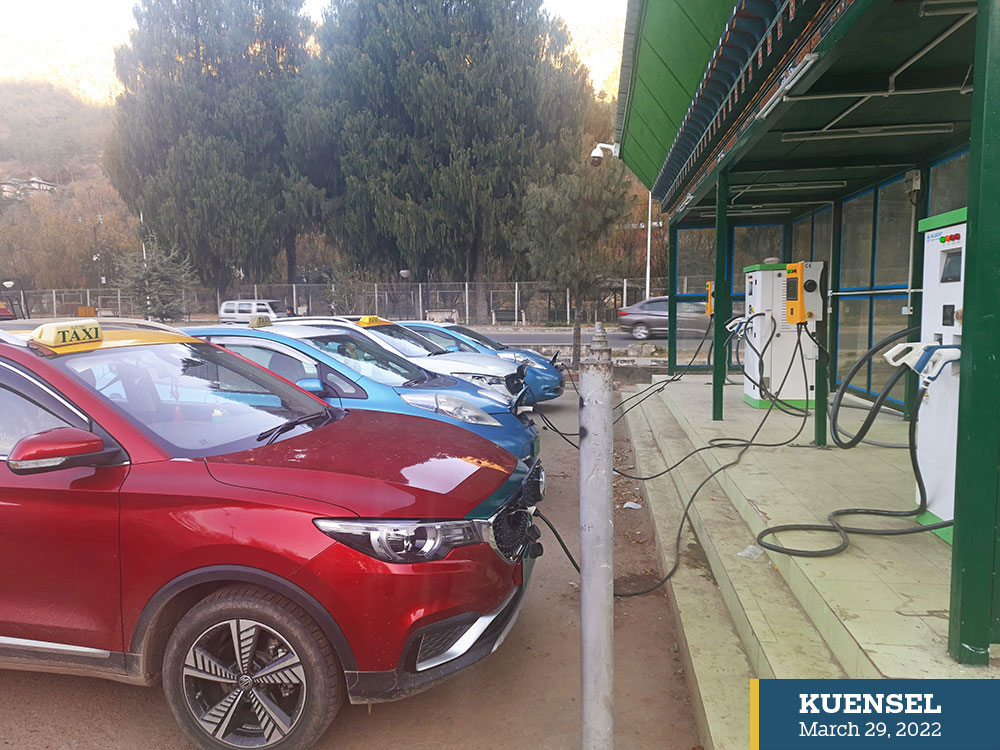While Kuensel’s regular coverage of the government’s EV project (March 26, March 19, March 14) is appreciated, the vast majority of EV owners in Bhutan, which are privately owned and not taxis, are almost never mentioned. As having catered to this silent majority since 2014, I would like to share information for a more balanced view of EVs in Bhutan.
We were one of the first companies to introduce EVs for the mass consumer market in Bhutan in 2014 with the Nissan Leaf and have gone through ups and downs of the EV experience in Bhutan so far. Our work on EVs started in 2010 when we assembled an EV in Bhutan and applied for a patent. Although almost all the components were imported, we designed and fabricated the critical component connecting the electric motor to the gearbox in Bhutan. We also used open source firmware and purchased other software for the vehicle control system and the battery management system.
The lesson learnt from this experience was that the firmware for managing the batteries and the overall operation of the vehicle plays a critical role in the development and performance of the EVs. The EV is basically a computer with wheels.
With His Majesty’s the King’s visionary drive to lead us towards a technology driven society in the information age, many tech companies and individuals in the country are already capable of writing the complex codes for the EVs. Without having to invest in car factories, this is one area where Bhutan can take leadership in the EV manufacturing ecosystem.
On the EV ownership experience, most EV owners are deeply satisfied with their cars. Some have owned their Leafs for the last 9 years and have barely had to visit the workshop for service. So apart from the obvious fuel savings, the almost nonexistent regular maintenance expenses is a big bonus.
Also concerns initially expressed 9 years ago about the life of the EV battery and the replacement costs have been effectively done away with since the EV owners are still driving their vehicles today. Some Leafs in Bhutan have driven more than 300,000 kilometres and are still going strong.
Our customers have been sharing these experiences by word of mouth with friends and family and the negative perception of EVs have slowly changed to positive. Buyers of our EVs are more discerning and have done additional online research in addition to talking with other Leaf owners before a purchase. Our main customer base continues to be this discerning group. This is a hopeful sign for EVs since about 90 percent of overall passenger car ownership in Bhutan is private ownership and only 8 percent are taxis.
Although range anxiety was a major concern in the beginning, that too soon waned as EV owners over the years found that almost 98 percent of their driving is done within Thimphu. Like most car owners, only once in a while we may take a long distance trip.
Already with the government EV project’s much appreciated efforts with installation of both DC fast chargers and AC Chargers, EV driving within western Bhutan is easily possible today. By the end of the year the project will have installed the DC and AC chargers in all the 20 dzongkhags as reported by Kuensel.
Also, the batteries in the EVs have more than doubled in capacity since 2014. Many EVs are now capable of driving more than 300 km on a charge. The manufacturer claims of higher range have to be tempered by our mountainous terrain which was another learning experience.
Battery quality has also improved over the years with the latest state of the art technology and materials being used. This however still adds to the cost of the EVs and keeps EV prices high in Bhutan even with the tax free incentives for all and additional subsidy for the EV taxi owners.
The next push should be for cheaper EVs which are at par with the fuel versions. Analysts predict that this cost parity will happen within the next 5 year and EVs will be cheaper than fuel cars by 2026. In Bhutan with the government’s tax incentives and subsidies, we could achieve this earlier. Additionally, government support with encouraging EV manufacturers to sell the cheaper EV models to Bhutan would be a much welcome intervention. Local car dealers in Bhutan are by themselves small fry for the manufacturers and have little leverage with the multinational manufacturers.
The EVs project success with taxi owners have encouraged truck owners and drivers to consider switching to electric and the Government’s next focus could be on electric trucks to replace diesel trucks. Electric buses are another low hanging fruit.
Diesel continues to be the top commodity import from India in 2019 alone Bhutan imported about Nu 8 Billion worth of diesel or 155 million liters, mostly for the trucking industry .
Electric truck and bus manufacturers have expressed interest to provide Bhutan with cost reductions on their truck and bus exports to Bhutan in exchange for carbon credit. This is yet another avenue for Government to support electric vehicle uptake in Bhutan. As diesel prices continue to rise with a concurrent rise in the price of essential goods, shifting to electric cargo transport could reduce overall inflation for essential goods which impacts the poorest the hardest. The nation’s carbon footprint could also be significantly reduced.
The government action of negotiating with manufacturers will not cost the Government anything. We already have embassies and consulates in the various manufacturing countries such as India, the EU, and the US. Some manufacturers even may provide free of cost all the electric buses we need for public transport in exchange for carbon credit. Something well worth exploring.
Bhutan’s EV journey has come a long way since 2014 and the future looks bright.
Contributed by
Tashi Wangchuk, (PhD)
Thunder Motors Pvt. Ltd.


